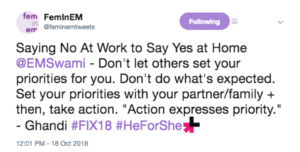I was inspired by FIX 2017.
This isn’t a unique situation to me but one that’s important for me to state because it was unexpected. I figured I would go and listen and hear a lot of things I already knew. I was wrong.
Amongst the incredible stories, amazing journeys taken by powerful women and men, one thing stuck with me: “Be a Champion for Change.” I left FIX 2017 wondering what my role was. Was it simply to amplify the messages of the amazing folks who spoke or was it something more? That question led me to apply to give a talk at FIX 2018 on the above topic.
Despite my asking for this assignment, I found it extremely challenging and, many times I thought about backing out. Writing this 10-minute talk was harder than almost any other talk I had created because it wasn’t about something clinical or something about education, it was about me; my life, my family. Telling that kind of story isn’t something I do and it’s definitely not something I excel at but, this was an important journey for me to take.

The story is in the podcast and it would be ridiculous to restate it in text. But there are some messages in the talk that I think bear repeating.
Although the title of the talk was “Saying No at Work to Say Yes at Home: Stepping Out of the Academic Rat Race,” the talk was really about us setting our own priorities and then taking action to make them happen. Too frequently in our lives, and particularly in academic medicine, we let others decide what’s important in our careers instead of deciding on our own. Perhaps even more pervasive is that we set goals and objectives early in our career and then slavishly stick to them even when our lives and priorities change.
For me, it was the changes that naturally come with children. As my family grew, I continued to blindly work towards my academic goals and, I was achieving them and so much more. But in the race to move forward, I lost site of my partners goals and career. I had failed because I was no longer supporting her. My goals and the perceived measure of success had changed as my home life changed but I failed to respond to those changes.

Seeing that we weren’t happy, I realized a change was needed. My actual priorities needed to be brought in line with the career I was pursuing. For me this meant less travel for lecturing, less moonlighting and moving off of the academic track I had created for myself years ago. Despite resetting those priorities, I found that nothing changed: I continued to travel for lectures, continued to accrue the merit badges for promotion and we continued to be unhappy. The reason was quite simple – the priorities had been reset but actions hadn’t been taken to make the new priorities happen. Action expresses priority. It’s simply not enough to make a new set of priorities. We must take action to make them happen.

This is my challenge to all of us: set your own priorities and take action to make them happen. Sound simple but it’s hard. It means jumping out of the overachiever mode we’ve been in all of our lives and doing what’s right for you, your partner and your family. We can’t do everything, we can’t be everywhere and we will always carry with us guilt of not being able to do everything. But If we set our own priorities and meet them, we’ll be much happier than if we meet priorities that aren’t ours.
Finally, during the talk I made a call for more men: more men in academics supporting men making these choices. More male leaders pushing us to meet our priorities. More male role models showing us how to be an academic and a real part of a family.

Watch the full FIX18 talk below!
Thanks for raising this issue, super important and incredible coming from you. I think another big wrinkle is where one is in their career, i.e. if youre still pretty junior and even if you have a strong sense of your priorities there is a fear of getting labeled as “lazy” or “lacking ambition” at such an early stage, that could be pretty devastating career-wise. Of course, the other side of the equation is that perhaps if its “built-in” from earlier on it wouldn’t feel like a such a 180 later on. Hmm…